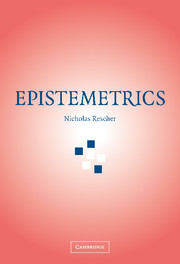Book contents
- Frontmatter
- Contents
- Preface
- 1 Asking for More Than Truth: Duhem's Law of Cognitive Complementarity
- 2 Kant's Conception of Knowledge as Systematized Information
- 3 Spencer's Law of Cognitive Development
- 4 Gibbon's Law of Logarithmic Returns
- 5 Adams's Thesis on Exponential Growth
- 6 Quality Retardation
- 7 How Much Can Be Known? A Leibnizian Perspective on the Quantitative Discrepancy Between Linguistic Truth and Objective Fact
- 8 On the Limits of Knowledge: A Kantian Perspective on Cognitive Finitude
- Conclusion
- Bibliography
- Index of Names
2 - Kant's Conception of Knowledge as Systematized Information
Published online by Cambridge University Press: 06 August 2009
- Frontmatter
- Contents
- Preface
- 1 Asking for More Than Truth: Duhem's Law of Cognitive Complementarity
- 2 Kant's Conception of Knowledge as Systematized Information
- 3 Spencer's Law of Cognitive Development
- 4 Gibbon's Law of Logarithmic Returns
- 5 Adams's Thesis on Exponential Growth
- 6 Quality Retardation
- 7 How Much Can Be Known? A Leibnizian Perspective on the Quantitative Discrepancy Between Linguistic Truth and Objective Fact
- 8 On the Limits of Knowledge: A Kantian Perspective on Cognitive Finitude
- Conclusion
- Bibliography
- Index of Names
Summary
(1) Knowledge is not just a matter of information as such, but of information that is coherently and cohesively systematized. (2) This view of knowledge as properly systematized information – in effect, information as structured in an idealized expository treatise – goes back to Immanuel Kant. (3) Cognitive systematization is hierarchical in structure because a systemic organization of the exposition of the information at issue into successively subordinate units becomes paramount here. And, viewed in this light, structure will of course reflect significance with larger units dominating over subordinate ones.
Distinguishing Knowledge and Information
The interplay between knowledge and information is pivotal for the present deliberations. Actual information (in contrast with misinformation) requires little more than truth. But knowledge is something far more demanding: it calls for information that is organized, purified, systematized. It makes no sense to say “It is known that p, but it may possibly not be so (or … “there are considerations that lead to doubt about it”).” From the cognitive point of view, knowledge is money in the bank. It must fit together coherently. The very concept of knowledge is such that what is known must be systemically consolidated: the matter of quality will also play a crucial role. For items of information are not created equal. Some are minute and trivial, others large and portentous. So there is little point to merely doing a nose count here. Only information that is scrutinized, verified, coordinated, and systematized can plausibly qualify to be regarded as knowledge.
- Type
- Chapter
- Information
- Epistemetrics , pp. 9 - 14Publisher: Cambridge University PressPrint publication year: 2006



